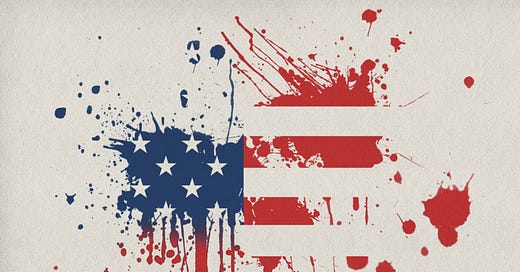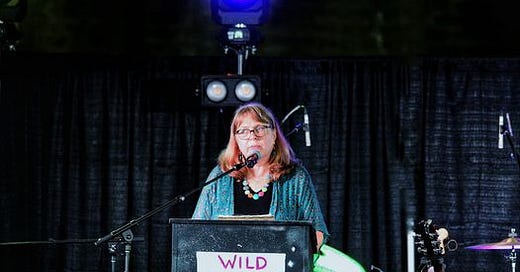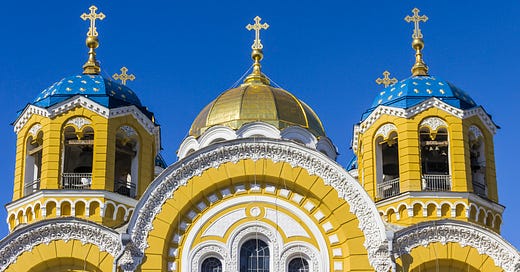

Discover more from The Cottage
With the FBI search of Donald Trump’s Mar-a-Lago home, violent rhetoric and threats of an impending Civil War skyrocketed on social media. Ben Collins, disinformation and extremism expert, was all over traditional cable with dire warnings: “There are a lot of Americans right now who are extraordinarily angry. . . They believe this is the end. . . that we’re in a full-fledged civil war. . . It is much worse than you can imagine.”
As an historian of nineteenth-century America, I hate talk of civil war. The American Civil War — the actual one — was a bloody, horrible affair where brothers and cousins murdered one another. About 2% of the entire population was killed in combat, more than 600,000 men. The military number doesn’t include civilian losses or prison deaths, permanent injuries and disabilities, mutilated limbs, or the trauma of sexual violence and rape.
Civil wars are the most uncivil of wars, bloodletting between siblings the most violent conflicts. Indeed, some political scientists argue that civil war violence is brutally irrational, and particularly gruesome in hegemonic populations when fueled by rivalry and revenge.
And now — all this glib chatter of civil war. But people aren’t kidding: they desire blood; they’ve been longing for it; they crave revenge. Some of America’s white Christian nationalists want to kill others. And, if it comes to it, a lot of white people will be killed as well as the nationalists’ most despised enemies. Civil war is like that. There are no real winners, just death. Bloody apocalypse and civil war are malevolent twins.
Trump’s base feeds on perceived persecution and the stance of innocent victimhood — especially when carried out against true believers by actors like the “deep state,” “Soros-liberals,” “the woke mob,” or a “fake” president. In some ways, nothing better could happen to Trump and his followers in mid-August. In the nadir of summer politics, as heat bakes the nation, comes the Beast of the FBI at the behest of Antipresident Joe Biden to awaken the faithful that the Apocalypse is on the horizon and they need to remain alert.
If the above paragraph sounds religious, it is. And if it sounds fascist, it is. And if it sounds like Trump-authoritarianism, it is. On the extremist right, the FBI action is being interpreted through three languages of political cataclysm — all pointing toward a bloody American Armageddon. A legally executed search warrant results in all this over-the-top, verbal frenzy of violence, fixated on bloody vengeance, purifying the nation.
Blood. It is always about blood.
* * * * *
Recently, British economist Umair Haque wrote two thoughtful and chilling essays on Medium (“The Next Stage of American Collapse” and “The Danger of American Collapse is Very Real”) about the way authoritarians, fascists, and theocrats are coalescing into a single political movement to end American democracy. Some quotes make Haque’s point:
A seriously grim truth. America’s lunatics have formed an alliance. A relationship of convenience has been forged between theocrats like Amy Coney Barrett and her ilk, 1930s style fascists like Trump’s advisors, authoritarians like Trump’s cronies, and “white nationalists” like the militants who shed blood in Congress.
All the bad guys have joined forces. All the bad guys meaning all the bad guys it’s possible for a society to have, really. . .
The bad news is that these are the three great, historic enemies of modern democracy — theocrats, fascists, and authoritarians. The good news is that they don’t usually come together and hold hands. They’re usually suspicious of one another, keeping one another at arms length.
When theocrats, fascists, and authoritarians form an alliance, it’s really bad news. It points to the most severe form of social collapse on the cards. . .
Part of the reason societies don’t often collapse suddenly like America is that these three groups don’t often come together, because they make strange and uncomfortable bedfellows. Godless fascists, pious theocrats, and authoritarians only interested in money and power? That’s a strange throuple to say the least. . .
So why have these three groups come together in America? Well, for a simple enough reason. They‘ve understood that together, they can collapse democracy, and carve up the smoldering ruins between them. Neither one of these factions is powerful enough on its own to do the job. But together, they represent a social movement and political bloc with enough power to actually do the job of detonating the house of democracy from within, and reducing it to rubble.
I’m not entirely sure I can speak to social collapse. The United States is certainly strained right now, and these three groups do seem to have coalesced in some ways, especially around certain political leaders, shared narratives (mostly in the form of conspiracy theories), and increasingly common language (often framed in biblical imagery).
Of the three movements, the theocratic one is most familiar to me — as understanding and studying it has occupied a significant part of my work over the last three decades. Theocratic Christianity, now called White Christian Nationalism or Christofascism, is a very particular form of political Christianity that uses the language, stories, and rituals in service of the elect — the true people of God — to justify their singular right to dominate and rule this world.
Haque notes some differences between political fascism and Christofascism:
Ultimately, fascism in all its forms is about the pure and true having the power of life and death over the impure and faithless. . .
In the orthodox fascist context, this hierarchy of hate is defined by blood. Some are above the rest by virtue of purity of blood. Christian Nationalism, as a kind of mutant fascism, keeps such distinctions necessarily vague. The pure of faith are to be above the rest — and perhaps, within that category, purity of blood matters, too.
This is America’s Taliban — and it’s baying for blood, lusting for power.
While a genuine fascist is all about “blood and soil,” Christian fascism has to be more, well, flexible. Subtle even. After all, if you claim to be a universal religion, it can’t just be about ethnicity. It has to be about “pure faith.”
But I think it is more than pure faith. And it isn’t just about ethnicity. Christian nationalism is always about pure blood and purifying blood, which, in Christianity, is about something else, something theological that bleeds over (if you’ll pardon the expression) into power, race, politics, and nationality.
If you’ve been paying attention to Christian theology in recent years, blood has been an important topic of discussion. There’s been an extended argument over the idea of sacrificial blood atonement — the doctrine that the spilling of Christ’s blood is necessary for salvation. In it rawest version, some Christians believe that God killed Jesus to cleanse believers from sin, that this blood sacrifice — this divine murder — opened heaven to the faithful. There are many more sophisticated forms of the argument, but the components almost always come down to some similar basic structure of these ideas. And the outlines of it have been in place for a thousand years.
A good number of theologians and historians have taken on this theory (which has been a dominant understanding in western Christianity about what happened at the Cross), pointing out a variety of alternatives within the broader Christian tradition and formulating new, non-bloody possibilities with the hope of a less violent future for the church.
The theological worry? A bloody atonement has created a bloody religion. The Cross is central to Christianity. If it is understood as an act of divine violence against a blameless victim, then the possibility of sacred brutality can extend through the entire tradition.
If one is cleansed by Jesus’ innocent blood, so the world must also be cleansed. In effect, Jesus is the ultimate pure blood. All washed in his blood are also, in some way, made pure. From this angle, pure faith and pure blood are inseparable. The evidence for the negative impact of a bloody atonement in the history of Christendom is sadly, painfully obvious. This isn’t just a theory. It is theology — and its repercussions.
To be clear: Not every Christian who holds to the theory of blood-atonement is a Christian nationalist, but Christian nationalism depends on this theology and can’t survive without it. The pure blood of Jesus is necessary to the idea of a pure religion, and far too many Christians believe that their mission is to purify the entire world through blood.
Jesus’ blood matters in Christianity. And purifying by blood matters in Christianity. Its theological centrality manifests itself in a variety of ways, some of it relatively benign, as in the devotion of the Catholic Mass or in revival tents of Baptists who sing,
There is pow'r, pow'r, wonder-working pow'r
In the blood of the Lamb;
There is pow'r, pow'r, wonder-working pow'r
In the precious blood of the Lamb.
Pure blood is powerful blood, pure blood is the very manifestation of divine presence and salvation. Blood matters.
It doesn’t always result in political bloodletting. Reverent Catholicism or heartfelt revivalism certainly don’t always become fascism.
My argument here, however, is that Christianity always holds the possibility of religious nationalism or fascism — believing in a blood atonement is a dangerous thing, far more dangerous than we’d like to admit. It is only a few theological steps from a “fountain filled with blood” to desiring actual blood or seeking to purify the world with blood. The church itself has never been shy of wielding the sword against others or its own. When threat and fear arise, they stoke the desire for purity, and purity is embraced as a sacred mission to cleanse a people, community, or nation, there’s very little to stop the lure of holy violence. Call it a crusade, Christian nationalism, or Christofascism. But by whatever name it has been — or will be called — it is bad.
And it is in our blood.
* * * * *
One of the possible futures for America is that the unholy trinity of theocrats, fascists, and authoritarians launches their desired Civil War to quench their thirst for blood.
What can stop this?
That’s a huge question. And, I suspect, it is also a question that many people and entities far beyond my purview are wrestling with right now. I admit to feeling a certain helplessness when listening to the news — or reading articles like the ones linked to today’s post.
However, I do know one thing that might help — Christianity itself. Only Christians can finally and fully reject the bloody theology that has so often resulted in calamity and that threatens us now.
Oddly and rarely, Christianity has risen above its bad blood to achieve its alternative vision of peace with amity. For every violent emperor, bad pope, twisted crusader, and abusive preacher, there have always been protesters, subversives, resisters, truth-tellers, healers, and saints.
Whenever Christianity practices goodness and justice, it almost always emerged from the latter group — the quiet, the powerless, the prayerful, the questioners, the mystics, the heretics, the wise, and the wanderers. It is a Christianity that leans toward love, afloat in the waters of grace, and not a religion obsessed with blood. It knows that purity is not the point.
That’s what will help unhinge this madness — risky goodness. Attentiveness to where theology can go awry. The only antidote to theocratic Christianity is the brave, kind, persistent, merciful, and insistent faith that stands with and for human solidarity and comity. We can’t afford blood-soaked religion any more.
Christians must stand up, speak up, and do good right now. Civil war isn’t funny. We can’t let it happen. We don’t need purity. We need decency. And peaceable community.
There can be no hedging of bets when other Christians are calling for blood to purify the nation. We must remove the curse of bad blood before it kills us all.
INSPIRATION
Ultimately, we have just one moral duty: to reclaim large areas of peace in ourselves, more and more peace, and to reflect it toward others. And the more peace there is in us, the more peace there will also be in our troubled world.
― Etty Hillesum
Skimming lightly, wheeling still,
The swallows fly low
Over the field in clouded days,
The forest-field of Shiloh—
Over the field where April rain
Solaced the parched ones stretched in pain
Through the pause of night
That followed the Sunday fight
Around the church of Shiloh—
The church so lone, the log-built one,
That echoed to many a parting groan
And natural prayer
Of dying foemen mingled there—
Foemen at morn, but friends at eve—
Fame or country least their care:
(What like a bullet can undeceive!)
But now they lie low,
While over them the swallows skim,
And all is hushed at Shiloh.
— Herman Melville, “Shiloh, A Requiem” (1862)
In a theological perspective it is evident that the content of this fascist religion [right wing Christianity] contradicts the message of the Jewish-Christian tradition. The God of the prophets did not preach the nation-state, but community between strangers and natives. The apostle Paul did not base the justification of sinners on the Protestant work ethic, but on grace, which appears for young and old, for diligent and for lazy people! And Jesus did not make the family the central value of human life, but the solidarity of those deprived of their rights. The most important norms of the Moral Majority are not contained in Christian faith, as we can see from the many critical remarks against the family that appear in the gospels. It is characteristic of Christofascism that it cuts off all the roots that Christianity has in the Old Testament, in the Jewish Bible. No word about justice, no mention of the poor, whom God comes to aid, very little about guilt and suffering. No hope for the messianic reign. Hope is completely individualized and reduced to personal success. Jesus, cut loose from the Old Testament, becomes a sentimental figure. The empty repetition of his name works like a drug: it changes nothing and nobody. . . Jesus, who suffered hunger and poverty, who practiced solidarity with the oppressed, has nothing to do with this religion.
― Dorothee Soelle



















I expect this will raise some issues and comments -- I'll try to jump in where possible. I'm frankly a bit nervous about this post, but really felt these things needed to be said.
Thank you for this, Diana. I hadn't thought about the blood atonement imagery that is so pervasive as a connection to this "Christian Nationalist" movement. I used to refuse to sign along with the praise band saying I'd never been bled on by the Lamb...
I'm afraid that those who are calling for a "cleansing" Civil War don't understand the real consequences. They won't return at the end of each say to an easy chair, cable and a cold beer. We watch closely from the North hoping beyond hope that we don't follow suit.